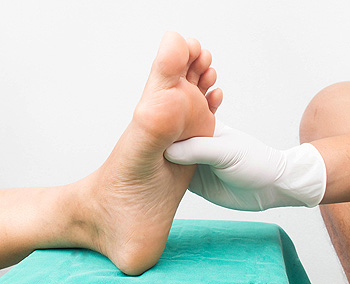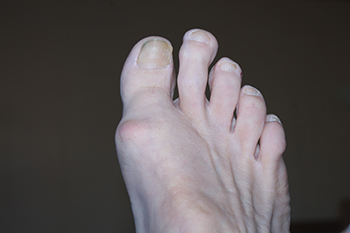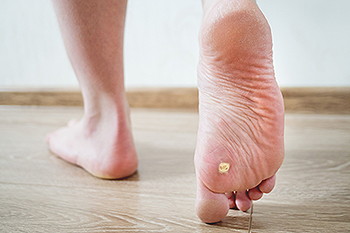Connect With Us
Blog
Items filtered by date: June 2023
The Do's and Don’ts of Diabetic Foot Care

Diabetes is a condition that can affect the feet. Maintaining proper diabetic foot care is crucial in preventing unwanted foot ailments from developing. This can begin by washing and drying the feet every day, followed by applying a moisturizer on them. It is helpful to refrain from using any creams between the toes, as this may lead to additional foot conditions. Diabetic patients may have neuropathy, which is the inability to feel sensations in the feet and lower legs. As a result, using a mirror is a good way to check the soles of the feet for any cuts or scrapes that may have developed. It is beneficial to have the toenails properly trimmed weekly, and this helps to prevent an ingrown toenail from developing. Many people who are diabetic know the importance of refraining from walking barefoot, which can be detrimental to the feet. If you have diabetes, it is strongly suggested that you are under the care of a podiatrist who can help you to manage this serious condition.
Diabetic foot care is important in preventing foot ailments such as ulcers. If you are suffering from diabetes or have any other concerns about your feet, contact one of our podiatrists from Southwest Podiatry. Our doctors can provide the care you need to keep you pain-free and on your feet.
Diabetic Foot Care
Diabetes affects millions of people every year. The condition can damage blood vessels in many parts of the body, especially the feet. Because of this, taking care of your feet is essential if you have diabetes, and having a podiatrist help monitor your foot health is highly recommended.
The Importance of Caring for Your Feet
- Routinely inspect your feet for bruises or sores.
- Wear socks that fit your feet comfortably.
- Wear comfortable shoes that provide adequate support.
Patients with diabetes should have their doctor monitor their blood levels, as blood sugar levels play such a huge role in diabetic care. Monitoring these levels on a regular basis is highly advised.
It is always best to inform your healthcare professional of any concerns you may have regarding your feet, especially for diabetic patients. Early treatment and routine foot examinations are keys to maintaining proper health, especially because severe complications can arise if proper treatment is not applied.
If you have any questions please feel free to contact our offices located in Dallas, and Carrollton, TX . We offer the newest diagnostic and treatment technologies for all your foot and ankle needs.
Arthritis Can Cause Pain in the Feet and Ankles
Factors That Cause Numbness in the Toes

A feeling of numbness in the toes may be nothing more than the result of wearing shoes that do not fit properly. For instance, high heeled shoes with a narrow and pointy toe box can be the direct cause of this phenomenon. In those cases, removing the shoes may fix the problem. However, if numbness in the toes is frequent, or even chronic, an underlying cause may be indicated. One major cause of numbness in the feet and toes can be from diabetes. Damage to the peripheral nerves from high levels of blood sugar can block feeling in the toes. A condition called Morton’s neuroma, which is a thickening of the nerve tissues near the ball of the foot can also cause numbness that affects the toes. Among the other medical conditions that can result in numbness of the toes are gout, arthritis, and hammertoe. If numb toes becomes a frequent problem, it is suggested that you make an appointment with a podiatrist for a full exam and diagnosis.
Neuropathy
Neuropathy can be a potentially serious condition, especially if it is left undiagnosed. If you have any concerns that you may be experiencing nerve loss in your feet, consult with one of our podiatrists from Southwest Podiatry. Our doctors will assess your condition and provide you with quality foot and ankle treatment for neuropathy.
What Is Neuropathy?
Neuropathy is a condition that leads to damage to the nerves in the body. Peripheral neuropathy, or neuropathy that affects your peripheral nervous system, usually occurs in the feet. Neuropathy can be triggered by a number of different causes. Such causes include diabetes, infections, cancers, disorders, and toxic substances.
Symptoms of Neuropathy Include:
- Numbness
- Sensation loss
- Prickling and tingling sensations
- Throbbing, freezing, burning pains
- Muscle weakness
Those with diabetes are at serious risk due to being unable to feel an ulcer on their feet. Diabetics usually also suffer from poor blood circulation. This can lead to the wound not healing, infections occurring, and the limb may have to be amputated.
Treatment
To treat neuropathy in the foot, podiatrists will first diagnose the cause of the neuropathy. Figuring out the underlying cause of the neuropathy will allow the podiatrist to prescribe the best treatment, whether it be caused by diabetes, toxic substance exposure, infection, etc. If the nerve has not died, then it’s possible that sensation may be able to return to the foot.
Pain medication may be issued for pain. Electrical nerve stimulation can be used to stimulate nerves. If the neuropathy is caused from pressure on the nerves, then surgery may be necessary.
If you have any questions, please feel free to contact our offices located in Dallas, and Carrollton, TX . We offer the newest diagnostic and treatment technologies for all your foot care needs.
Treatment Options for Plantar Warts

A plantar wart is a growth that develops on the sole of the foot. The wart is caused by coming into contact with the human papillomavirus, or HPV. Plantar warts are most commonly seen on the ball or heel of the foot. Because these two areas take the force of your weight, the wart may become hardened and look like a callus. It also may contain tiny black dots that are actually dried up or clotted capillaries. Plantar warts are contagious and should not be touched, if possible, because they can be spread to other body parts. Treatment options range from applying salicylic acid to remove the wart layer by layer to removing the wart at one time by surgery. Additional treatments of plantar warts include spraying with liquid nitrogen and laser therapy to burn off the wart. Each type of treatment brings with it certain painful or annoying side effects, and the methods take varied amounts of time to get the best result. For help with a plantar wart, it is suggested that you make an appointment with a podiatrist who can prescribe the treatment that will work best for you.
Plantar warts can be very uncomfortable. If you need your feet checked, contact one of our podiatrists from Southwest Podiatry. Our doctors will assist you with all of your foot and ankle needs.
About Plantar Warts
Plantar warts are the result of HPV, or human papillomavirus, getting into open wounds on the feet. They are mostly found on the heels or balls of the feet.
While plantar warts are generally harmless, those experiencing excessive pain or those suffering from diabetes or a compromised immune system require immediate medical care. Plantar warts are easily diagnosed, usually through scraping off a bit of rough skin or by getting a biopsy.
Symptoms
- Lesions on the bottom of your feet, usually rough and grainy
- Hard or thick callused spots
- Wart seeds, which are small clotted blood vessels that look like little black spots
- Pain, discomfort, or tenderness of your feet when walking or standing
Treatment
- Freezing
- Electric tool removal
- Laser Treatment
- Topical Creams (prescription only)
- Over-the-counter medications
To help prevent developing plantar warts, avoid walking barefoot over abrasive surfaces that can cause cuts or wounds for HPV to get into. Avoiding direct contact with other warts, as well as not picking or rubbing existing warts, can help prevent the further spread of plantar warts. However, if you think you have developed plantar warts, speak to your podiatrist. He or she can diagnose the warts on your feet and recommend the appropriate treatment options.
If you have any questions please feel free to contact our offices located in Dallas, and Carrollton, TX . We offer the newest diagnostic and treatment technologies for all your foot and ankle needs.
Increasing Balance to Prevent Running Injuries

Any runner knows that preventing a running injury by looking after the health of the feet is an essential part of being a good runner. One way in which a runner can do this is by performing balance enhancing stretches. For example, to improve balance, a runner may consider performing a single leg balance stretch and squat. During this stretch, a runner stands on one leg while slowly and squatting repeatedly. By doing this stretch, a runner can essentially improve the extent to which they land evenly on each foot while running. If you are a runner looking to prevent the onset of running injuries, then it is suggested that you confer with a podiatrist today for advice and possible treatment.
All runners should take extra precaution when trying to avoid injury. If you have any concerns about your feet, contact one of our podiatrists of Southwest Podiatry. Our doctors will treat your foot and ankle needs.
How to Prevent Running Injuries
There are a lot of mistakes a runner can make prior to a workout that can induce injury. A lot of athletes tend to overstretch before running, instead of saving those workouts for a post-run routine. Deep lunges and hand-to-toe hamstring pulls should be performed after a workout instead of during a warmup. Another common mistake is jumping into an intense routine before your body is physically prepared for it. You should try to ease your way into long-distance running instead of forcing yourself to rush into it.
More Tips for Preventing Injury
- Incorporate Strength Training into Workouts - This will help improve the body’s overall athleticism
- Improve and Maintain Your Flexibility – Stretching everyday will help improve overall performance
- “Warm Up” Before Running and “Cool Down” Afterward – A warm up of 5-10 minutes helps get rid of lactic acid in the muscles and prevents delayed muscle soreness
- Cross-Training is Crucial
- Wear Proper Running Shoes
- Have a Formal Gait Analysis – Poor biomechanics can easily cause injury
If you have any questions, please feel free to contact our offices located in Dallas, and Carrollton, TX . We offer the newest diagnostic and treatment technologies for all your foot care needs.

